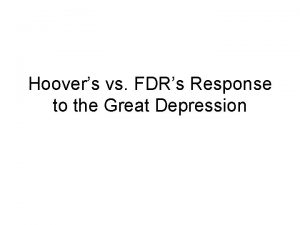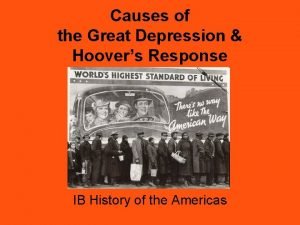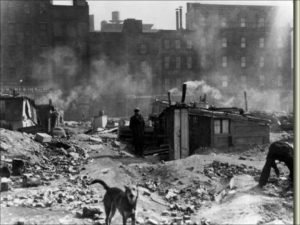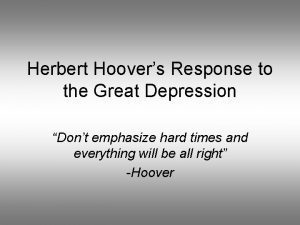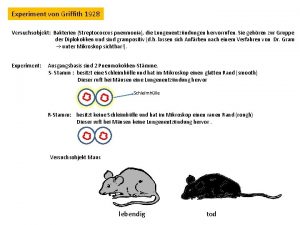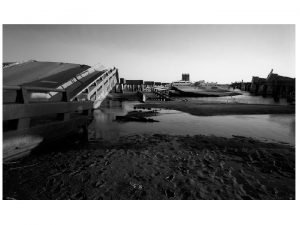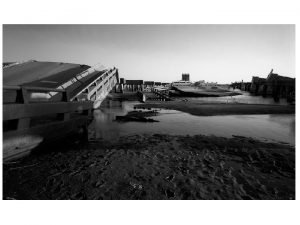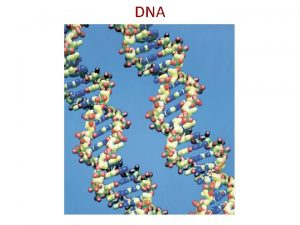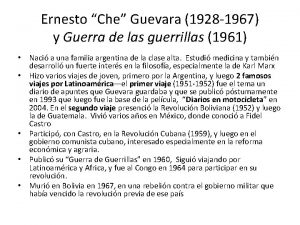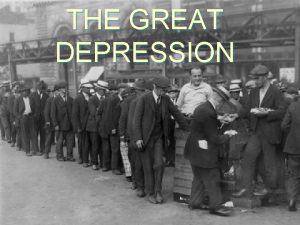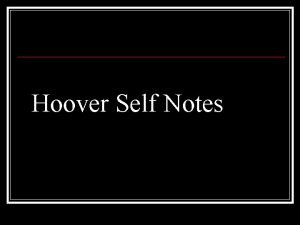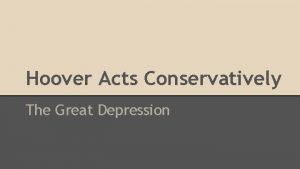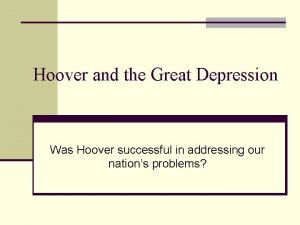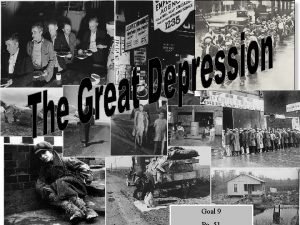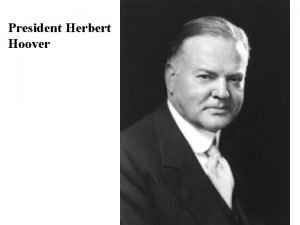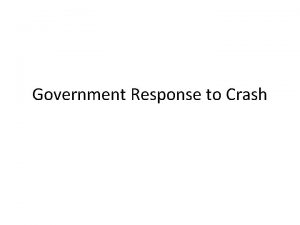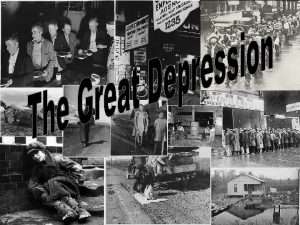Politics of the Depression HOOVER WINS 1928 ELECTION













- Slides: 13

Politics of the Depression

HOOVER WINS 1928 ELECTION § Republican Herbert Hoover ran against Democrat Alfred E. Smith in the 1928 election § Hoover emphasized years of prosperity under Republican administrations § Hoover won an overwhelming victory

HOOVER’S PHILOSOPHY § Hoover was not quick to react to the depression § He believed in “rugged individualism” – the idea that people succeed through their own efforts § People should take care of themselves, not depend on governmental hand-outs. § Believed in limited government intervention.

HOOVER STRUGGLES WITH THE DEPRESSION § After the stock market crash, President Hoover tried to reassure Americans § He said, “Any lack of confidence in the economic future. . . Is foolish” § He recommended business as usual

HOOVER TAKES ACTION: TOO LITTLE TOO LATE § Hoover gradually softened his position on government intervention in the economy § He created the Federal Farm Board to help farmers § He also created the National Credit Organization that helped smaller banks § His Federal Home Loan Bank Act and Reconstruction Finance Corp were two measures enacted to protect people’s homes and businesses

BONUS ARMY § A 1932 incident further damaged Hoover’s image § That spring about 15, 000 World War I vets arrived in Washington to support a proposed bill § The Patman Bill would have authorized Congress to pay a bonus to WWI vets immediately § Hoover called the Bonus marchers, “Communists and criminals”

BONUS MARCHERS CLASH WITH SOLDIERS § Hoover told the Bonus marchers to go home– most did § 2, 000 refused to leave § Hoover sent a force of 1, 000 soldiers under the command of General Douglas Mac. Arthur and his aide Dwight Eisenhower § Mac. Arthur’s 12 th infantry gassed more than 1, 000 marchers, including an 11 -month old baby, who died § Two vets were shot and scores injured § Americans were outraged and once again, Hoover’s image suffered

Hardships During the Depression § The Great Depression brought hardship, homelessness, and hunger to millions § Across the country, people lost their jobs, and their homes § Some built makeshifts shacks out of scrap material § Before long whole shantytowns (sometimes called Hoovervilles in mock reference to the president) sprung up

SOUP KITCHENS § One of the common features of urban areas during the era were soup kitchens and bread lines § Soup kitchens and bread lines offered free or low-cost food for people § Mostly run by charitable organizations § One of the largest soup kitchens in Chicago was run by the gangster, Al Capone.

RURAL LIFE DURING THE DEPRESSION § While the Depression was difficult for everyone, farmers did have one advantage; they could grow food for their families § Thousands of farmers, however, lost their land § Many turned to tenant farming and barely scraped out a living

THE DUST BOWL § A severe drought gripped the Great Plains in the early 1930 s § Wind scattered the topsoil, exposing sand grit § The resulting dust traveled hundreds of miles § One storm in 1934 picked up millions of tons of dust from the Plains an carried it to the East Coast

HOBOS TRAVEL AMERICA § 300, 000 transients – or hobos – hitched rides around the country on trains and slept under bridges (thousands were teenagers) § Injuries and death was common on railroad property; over 50, 000 people were hurt or killed

EFFECTS OF THE DEPRESSION § Suicide rate rose more than 30% between 1928 -1932 § Alcoholism rose sharply in urban areas § Three times as many people were admitted to state mental hospitals as in normal times § Many people showed great kindness to strangers § Additionally, many people developed habits of savings & thriftiness
 1932 electoral map
1932 electoral map What was hoover's response to the great depression
What was hoover's response to the great depression Chapter 14 section 3 hoover struggles with the depression
Chapter 14 section 3 hoover struggles with the depression Hoover's response to the great depression
Hoover's response to the great depression Compare and contrast fdr and hoover
Compare and contrast fdr and hoover Herbert hoover great depression political cartoon
Herbert hoover great depression political cartoon Hoovers response
Hoovers response Ariel sharon biography
Ariel sharon biography Griffith 1928
Griffith 1928 Flood control act
Flood control act Flood control act of 1928
Flood control act of 1928 Griffith 1928
Griffith 1928 Ernesto catena wikipedia
Ernesto catena wikipedia Cuadro comparativo del maximato
Cuadro comparativo del maximato
